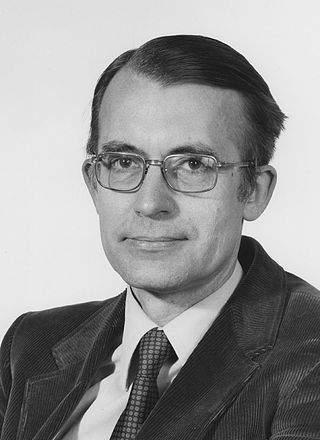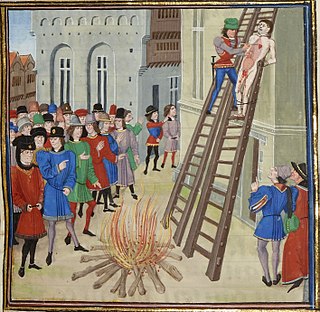
Sir Thomas More, venerated in the Catholic Church as Saint Thomas More, was an English lawyer, judge, social philosopher, author, statesman, and noted Renaissance humanist. He also served Henry VIII as Lord High Chancellor of England from October 1529 to May 1532. He wrote Utopia, published in 1516, which describes the political system of an imaginary island state.

David Herbert Lawrence was an English writer, novelist, short story writer, poet and essayist. His modernist works reflect on modernity, social alienation and industrialization, while championing sexuality, vitality and instinct. His best-known novels—Sons and Lovers, The Rainbow, Women in Love, and Lady Chatterley's Lover—were the subject of censorship trials for their radical portrayals of sexuality and use of explicit language.

Anthony Ashley Cooper, 3rd Earl of Shaftesbury was an English peer, Whig politician, philosopher and writer.

The Battle of Cocherel was a battle fought on 16 May 1364 between the forces of Charles V of France and the forces of Charles II of Navarre, over the succession to the dukedom of Burgundy. The result was a French victory.

A stateless society is a society that is not governed by a state. In stateless societies, there is little concentration of authority; most positions of authority that do exist are very limited in power and are generally not permanently-held positions; and social bodies that resolve disputes through predefined rules tend to be small. Different stateless societies feature highly variable economic systems and cultural practices.

Sir Edward Anthony Wrigley was a British historical demographer. Wrigley and Peter Laslett co-founded the Cambridge Group for the History of Population and Social Structure in 1964.
Sir Geoffrey Ernest Richard Lloyd, usually cited as G. E. R. Lloyd, is a historian of ancient science and medicine at the University of Cambridge. He is the senior scholar in residence at the Needham Research Institute in Cambridge, England.

Stylianos Pattakos was a Greek military officer. Pattakos was one of the principals of the Greek military junta of 1967–1974 that overthrew the government of Panagiotis Kanellopoulos in a coup d'état on 21 April 1967.

The 1794 Treason Trials, arranged by the administration of William Pitt, were intended to cripple the British radical movement of the 1790s. Over thirty radicals were arrested; three were tried for high treason: Thomas Hardy, John Horne Tooke and John Thelwall. In a repudiation of the government's policies, they were acquitted by three separate juries in November 1794 to public rejoicing. The treason trials were an extension of the sedition trials of 1792 and 1793 against parliamentary reformers in both England and Scotland.

Given textual and archaeological evidence, it is thought that thousands of Europeans lived in Imperial China during the Yuan dynasty. These were people from countries traditionally belonging to the lands of Christendom during the High to Late Middle Ages who visited, traded, performed Christian missionary work, or lived in China. This occurred primarily during the second half of the 13th century and the first half of the 14th century, coinciding with the rule of the Mongol Empire, which ruled over a large part of Eurasia and connected Europe with their Chinese dominion of the Yuan dynasty. Whereas the Byzantine Empire centered in Greece and Anatolia maintained rare incidences of correspondence with the Tang, Song and Ming dynasties of China, the Holy See sent several missionaries and embassies to the early Mongol Empire as well as to Khanbaliq, the capital of the Mongol-led Yuan dynasty of China. These contacts with the West were preceded by rare interactions between the Han dynasty and Hellenistic Greeks and Romans.

After the Indian Rebellion of 1857, the British Government took over the administration to establish the British Raj. The British Raj was the period of British rule on the Indian subcontinent between 1858 and 1947, for around 200 years of British occupation. The system of governance was instituted in 1858 when the rule of the East India Company was transferred to the Crown in the person of Queen Victoria.
Early in the First English Civil War the Long Parliament threatened to retaliate in kind if the Royalists tried and executed John Lilburne and two other Parliamentary offices for treason. Lilburne later described this as the declaration of Lex Talionis, and it brought about a practical—rather than moral—mutual restraint by the parties to the war on how they treated prisoners of war.

To be hanged, drawn and quartered became a statutory penalty for men convicted of high treason in the Kingdom of England from 1352 under King Edward III (1327–1377), although similar rituals are recorded during the reign of King Henry III (1216–1272). The convicted traitor was fastened to a hurdle, or wooden panel, and drawn by horse to the place of execution, where he was then hanged, emasculated, disembowelled, beheaded, and quartered. His remains would then often be displayed in prominent places across the country, such as London Bridge, to serve as a warning of the fate of traitors. For reasons of public decency, women convicted of high treason were instead burned at the stake.
Charles Stuart, that man of blood was a phrase used by Independents, during the English Civil War to describe King Charles I.

Essex's Rebellion was an unsuccessful rebellion led by Robert Devereux, 2nd Earl of Essex, in 1601 against Queen Elizabeth I of England and the court faction led by Sir Robert Cecil to gain further influence at court.

The National Association for the Promotion of Social Science (NAPSS), often known as the Social Science Association, was a British reformist group founded in 1857 by Lord Brougham. It pursued issues in public health, industrial relations, penal reform, and female education. It was dissolved in 1886.
Felix Vaughan was an English barrister, known for his role as defence counsel in the treason trials of the 1790s.

Thomas Walker (1749–1817) was an English cotton merchant and political radical.
The Jat people are a traditionally agricultural community in Northern India and Pakistan. Originally pastoralists in the lower Indus river-valley of Sindh, Jats migrated north into the Punjab region in late medieval times, and subsequently into the Delhi Territory, northeastern Rajputana, and the western Gangetic Plain in the 17th and 18th centuries. Of Hindu, Muslim and Sikh faiths, they are now found mostly in the Indian states of Punjab, Haryana, Uttar Pradesh and Rajasthan and the Pakistani provinces of Sindh and Punjab.













